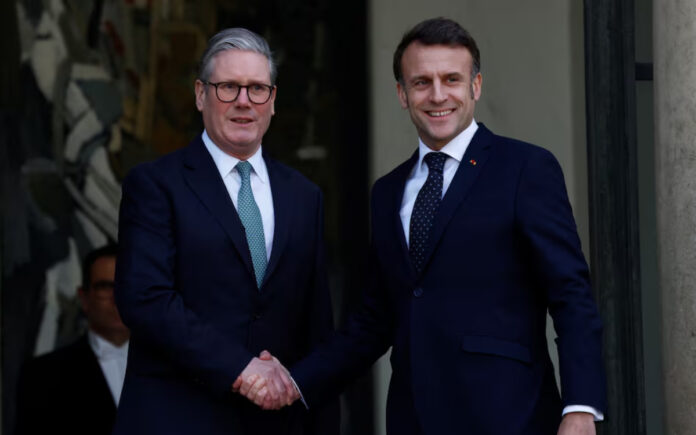Paris: European leaders convened in Paris on Monday for emergency talks, emphasizing the need for greater defense spending to strengthen the continent’s security. However, divisions emerged over a proposal to deploy peacekeeping troops to Ukraine as part of a potential settlement to the ongoing war.
The meeting, called by French President Emmanuel Macron, followed the Trump administration’s unexpected move to hold bilateral peace talks with Russia—excluding European allies and Ukraine. The negotiations are set to begin in Saudi Arabia on Tuesday.
Europe Confronts a Future with Less U.S. Protection
The U.S. decision to engage with Russia independently has left European officials alarmed, forcing them to reassess their role in Ukraine’s security and their reliance on U.S. military support.
British Prime Minister Keir Starmer, who had earlier expressed willingness to send peacekeepers to Ukraine, later clarified that any such deployment would require a firm U.S. security commitment. “It was too early to say how many British troops he would be willing to deploy,” he stated.
However, a European peacekeeping force presents significant risks. Direct military involvement could lead to confrontation with Russia, while European armies—already stretched thin from supplying Ukraine—face challenges in maintaining their defense capabilities. Additionally, many European nations are grappling with financial constraints, raising concerns over how increased military commitments would be funded.
Britain said it was ready to send peacekeeping troops to back up any Ukraine peace deal as European leaders gathered to agree a unified strategy, while Russian and U.S. officials prepared to meet for their own talks to try to end the conflict https://t.co/Mn675nbJe6 pic.twitter.com/xdPhvkDRaI
— Reuters (@Reuters) February 17, 2025
Defense Spending and Deepening Divisions
The debate over peacekeeping efforts revealed clear divisions among European leaders.
German Chancellor Olaf Scholz rejected the idea of deploying German troops, stating that such discussions were “highly inappropriate” without a concrete peace agreement. Instead, he pushed for reforms to European Union budget rules, arguing that defense spending exceeding 2% of GDP should not be restricted by EU fiscal policies.
Italian Prime Minister Giorgia Meloni also voiced skepticism about the peacekeeping proposal. According to sources in her office, she viewed the plan as “the most complex and perhaps the least effective” option under consideration.
Denmark’s Prime Minister Mette Frederiksen took a different stance, stating she was open to discussing troop deployments. “Russia is threatening all of Europe now, unfortunately,” she told reporters, emphasizing the need for Europe to increase support for Ukraine while also bolstering domestic defense capabilities.
Both Scholz and Polish Prime Minister Donald Tusk advocated for easing EU fiscal constraints to accommodate higher defense spending. Tusk confirmed that defense expenditures would no longer be classified as excessive spending under EU budget rules, thus avoiding penalties for breaching deficit limits.
U.S.-Russia Talks in Saudi Arabia
As European leaders debated their role in Ukraine, high-level negotiations between U.S. and Russian officials were set to take place in Saudi Arabia.
Russia has ruled out any territorial concessions, while Ukrainian President Volodymyr Zelenskiy has dismissed the talks as illegitimate due to Ukraine’s exclusion.
Also Read | Moscow Warns Italy Over President’s ‘Third Reich’ Comparison to Ukraine Conflict
Trump’s decision to engage directly with Russian President Vladimir Putin without consulting European allies shocked both Kyiv and Brussels. The upcoming U.S.-Russia meeting marks the highest-level in-person discussions between the two nations in years.
Saudi Crown Prince Mohammed bin Salman met with U.S. Secretary of State Marco Rubio, national security adviser Mike Waltz, and Middle East envoy Steve Witkoff in Riyadh ahead of the negotiations. On the Russian side, Foreign Minister Sergei Lavrov and Kremlin foreign policy adviser Yuri Ushakov are set to participate, according to the Kremlin.
Also Read | Cook Islands-China Deal Sparks Debate; PM Brown Promises Transparency
U.S. State Department spokesperson Tammy Bruce suggested the discussions would assess whether Russia was genuinely open to peace talks. Meanwhile, the Kremlin signaled its broader goal, stating the talks aimed at “restoring the entire complex of Russian-American relations.”
Keith Kellogg, Trump’s envoy for Ukraine, is not attending the Saudi talks but announced plans to visit Ukraine for three days starting Wednesday. Asked about potential U.S. security guarantees for European peacekeepers, Kellogg said: “I’ve been with President Trump, and the policy has always been: You take no options off the table.”



